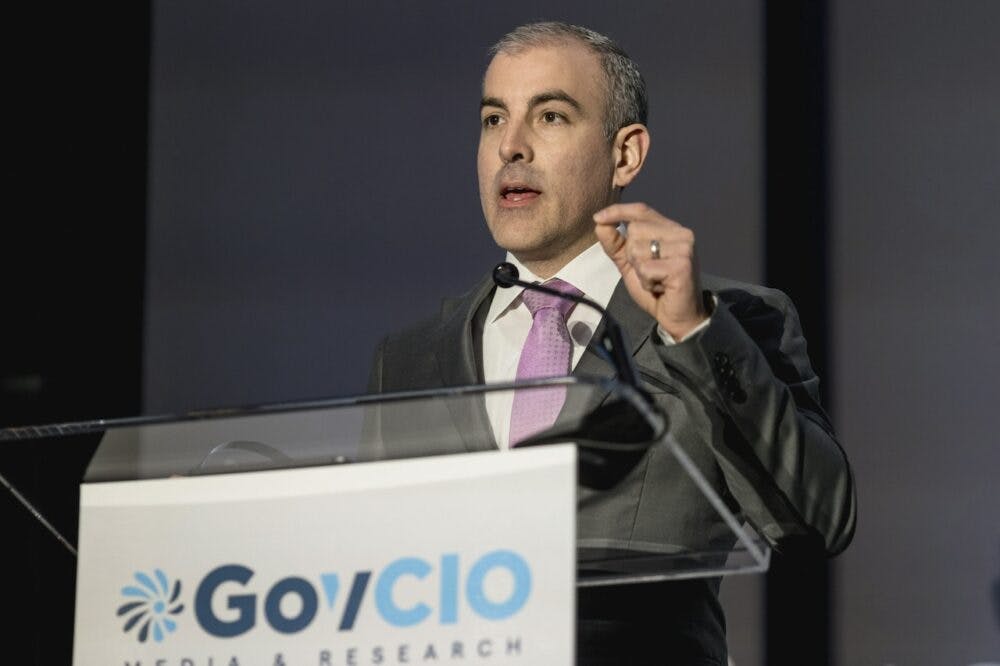VA Targeting Diversity in Genomics Research
The agency’s Million Veteran Program is advancing precision care and treatment for underrepresented populations.

The Department of Veterans Affairs is expanding its genomics research and advancing health care delivery by incorporating more diverse data in its Million Veteran Program, a program official said this week.
The Million Veteran Program is a broad research project that aims to uncover how genes, lifestyle and military exposures affect health conditions to help health care providers offer better preventative care and treatments of physical and mental illnesses. The agency is now working to rectify a deficit in genomic information from certain underserved populations, including women and minority groups.
“Women are really underrepresented in research. If we don’t have that representation, the health care that I’m getting may not be as good as the health care that a male may be getting because we’ve just done more research with those individuals,” said Jennifer Deen, the program’s associate director of cohort and public relations.
Since its launch in 2011, the program has enrolled 835,000 volunteer veterans, but only 75,000 of them were women.
“In order for us to have the data to find those miniscule differences and the DNA for conditions that affect women more differently, we really need to increase the number of women in that cohort,” Deen told GovernmentCIO Media & Research in a press round table. “We need to have diversity there so that we can see if this breast cancer prediction tool, [for example], works for Caucasian women, does it also work for Black women.”
Especially because it relies on volunteer participation, the program plans to prioritize its outreach efforts by partnering with internal offices like the VA’s Center for Women Veterans and also external groups to communicate its mission.
“A lot of our focus right now has been on creating these partnerships with other groups that have that reach and trust with our veteran population and can help talk about what MVP is how we protect information, and that it’s a good idea to consider enrolling and make that informed decision for yourself,” Deen said.
The program focuses on common conditions within both oncology and mental health treatment. To support the advanced data analytics around the genomic data and these conditions, the Department of Energy partnered with VA to provide the necessary advanced computational power.
Three projects currently underway with DOE includes researching prostate cancer prediction, suicide prevention algorithms and cardiovascular risk, Deen said.
Much of these efforts come down to better allocating treatment based on identifying risk factors, allowing health care providers to better serve patients depending on potential outcomes.
“There are people who are treated for prostate cancer right now that have benign prostate cancer, and [health care providers] don’t really have a good way of telling the differences,” Deen said. “So you’re doing an invasive treatment on somebody for whom that may not actually be necessary.”
This is a carousel with manually rotating slides. Use Next and Previous buttons to navigate or jump to a slide with the slide dots
-

Navy Memo Maps Tech Priorities for the Future Fight
Acting CTO’s memo outlines critical investment areas, from AI and quantum to cyber and space, as part of an accelerated modernization push.
5m read -

DOD Can No Longer Assume Superiority in Digital Warfare, Officials Warn
The DOD must make concerted efforts to address cyber vulnerabilities to maintain the tactical edge, military leaders said at HammerCon 2025.
4m read -

New NSF Program Cultivates the Future of NextG Networks
The agency’s new VINES program looks to tackle key challenges like energy efficiency and future-proofing wireless tech.
21m watch -

DHA CDAO Spearheads Master Data Catalog to Boost Transparency
Jesus Caban plans to boost DHA's data maturity through a new master data catalog, governance frameworks and inventory of tech tools.
5m read -

IHS Prepares to Deploy PATH EHR at Pilot Sites in 2026
IHS targets PATH EHR pilot in 2026, emphasizing governance, collaboration and interoperability as key pillars of the modernization strategy.
4m read -

Trump Orders Spark Government-Wide Acquisition Overhaul
As Trump pushes for a faster, simpler procurement system, agencies are leveraging AI and adapting strategies to meet new requirements.
5m read -

IRS Makes Direct File Code Public as Lawmakers Debate Program’s Fate
The agency sees the Direct File source code as beneficial to government digital services despite what happens with it in proposed budgets.
5m read -

Inside Oak Ridge National Lab’s Pioneer Approach to AI
Energy Department’s Oak Ridge National Lab transforms AI vulnerabilities into strategic opportunities for national defense.
22m listen -

A Look at Federal Zero Trust Transformation
Recent developments from CISA and DOD show how government is advancing zero trust quickly.
20m read -

Modernization Strategies to Enable Energy Innovation
Lawrence Berkeley National Lab and Maximus experts explore the modernization strategies driving digital transformation and operational resilience within the energy sector.
33m watch -

DOI Must Modernize Energy to Win AI Race, Secretary Says
Doug Burgum links AI innovation to energy reform as DOI advances digital infrastructure and wildfire response under Trump’s tech agenda.
2m read -

NIST to Release New AI Cybersecurity Guidance as Federal Use Expands
NIST plans to release AI cybersecurity guidance within the year to support safe adoption as federal agencies expand use cases.
4m read
















